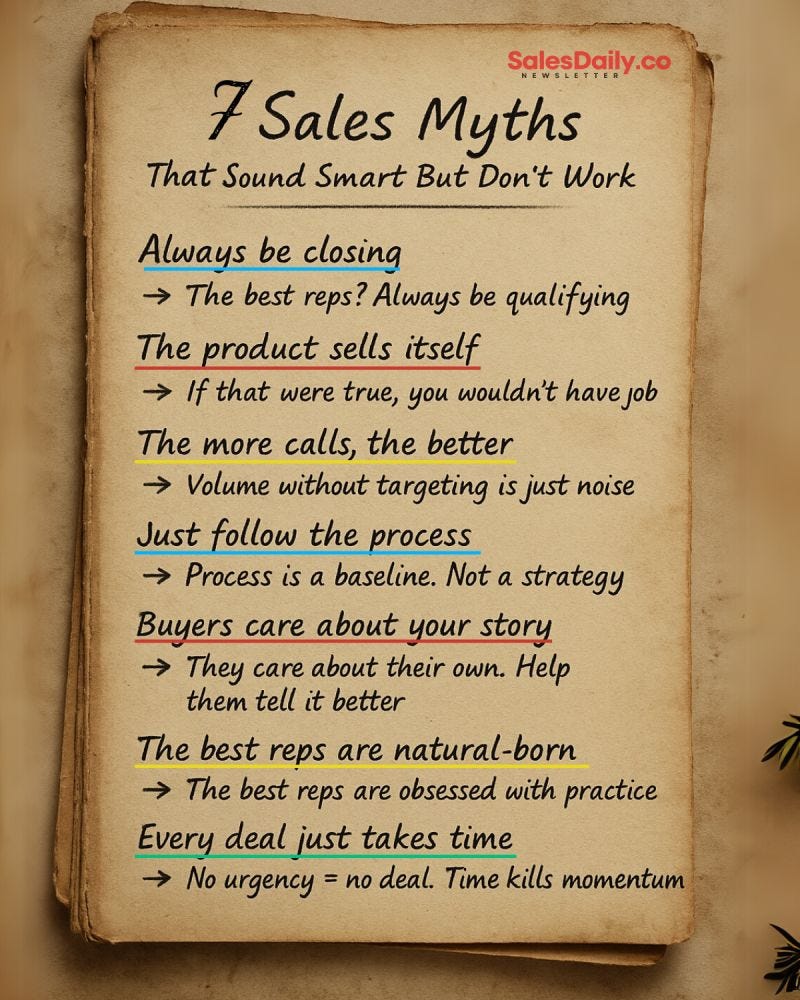#424: Why "Always Be Closing" Is Oversimplified: The Real Art of Sales
Forget the movie quotes. Sales is a science that demands planning, pivoting, and professionalism. Here’s how soft skills and executive functions make you a true sales pro.
Your new sales manager tells you to watch Glengarry Glen Ross this weekend, because your closing average is terrible, and you learn ABC - Always Be Closing. You also learn from this movie that it’s persistence, patience, and pressure that make the deal:
“I sat there five minutes … Then I sat 22 minutes by that kitchen clock on the wall. Ricky, not a word, not a motion.” - Shelley Levene (Jack Lemon), Glengarry Glen Ross talking about his $82,000 deal with the Nyborgs
And as you grow older, you learn that the ABCs sound catchy, but they’re oversimplified. All of those things you heard about sales, the quotes, taglines, and marketing make it sound easy. And if you have been at it for as long as I have, you have learned that it is a profession. One that you need to hone, refine, and improve on daily.
Sales is more than the 7 Myths in this graprhic. It is both art and science. Plug your client situation into an AI tool. Consider your value proposition, the competition, and who’s who: the advocate, gatekeeper, and decision-maker, factor in their personalities, past objections, and market trends. Sound simple? It’s not.
Soft Skills
I’m sure you can see that it’s more than just a simple sale. There are so many uncontrollable factors in the process, and each one of them steers you and forces you to pivot. I didn’t say give up, I said pivot. You share the same goal: to close the deal, but you must ensure that every variable is reviewed and that the environment hasn’t changed since you initiated the process.
Sales is a Science. Yet we think people are born to do it? No, they practice, they are prepared, and professional.
In my book, PROFITS, Your Seven Letters to Success, (download a free copy, but let me warn you, it was written before Grammarly existed), I take a shot at defining a sales professional.
Is a PEAK PERFORMER who has the abilities and understands the importance to PLAN and PREPARE
Understands and acknowledges their RESPONSIBILITIES to their organization and customers, and can RETAIN their business, while maintaining RESPECT with their clients, companies, and most importantly themselves
Takes OWNERSHIP and is ORGANIZED
Maintains a FOCUS on their duties and goals.
Has a character built on INTEGRITY, and they have personal INITIATIVE
Has the ability and TRUST to work in a TEAM environment
Provides all this to their internal and external customers with the utmost SINCERITY
And these are just the soft skills necessary to adapt, innovate, and pivot as needed.
Executive Functions
To be a successful sales professional, several core executive functions, the mental skills that help individuals manage themselves and achieve their goals, are crucial. Here are the key ones, and the examples of how they are essential in sales:
Working Memory
What it is: Holding and manipulating information in your mind over short periods.
Sales example: Remembering client details, product specs, and objections during a sales call or pitch.
Cognitive Flexibility
What it is: Shifting thinking and adjusting to new information or changing circumstances.
Sales example: Pivoting during a conversation when a client changes direction or raises unexpected concerns.
Inhibitory Control (Impulse Control)
What it is: Resisting distractions, staying focused, and not saying the first thing that comes to mind.
Sales example: Listening actively instead of interrupting, staying on message even when the client pushes emotional buttons.
Planning and Prioritization
What it is: Setting goals and determining the steps to reach them in the proper order.
Sales example: Building a weekly plan for prospecting, follow-ups, and closing activities, allocating time and energy wisely.
Self-Monitoring
What it is: Evaluating and adjusting your performance and behavior in real time.
Sales example: Noticing when you’re talking too much, adjusting your tone, or realizing when a pitch isn't landing.
Emotional Regulation
What it is: Managing frustration, rejection, and pressure without losing composure.
Sales example: Staying calm and positive after repeated rejections or during a tense negotiation.
The Kole Hard Fact
So the next time someone tells you, “Always Be Closing,” smile politely and then get back to work. Because the real pros know it’s not just about closing; it’s about thinking, planning, adapting, and serving. Sales isn’t a hustle, a grind, or a movie quote. It’s a discipline. It’s a profession. And like any great profession, it rewards those who treat it with the respect, skill, and care it demands, every single day.


